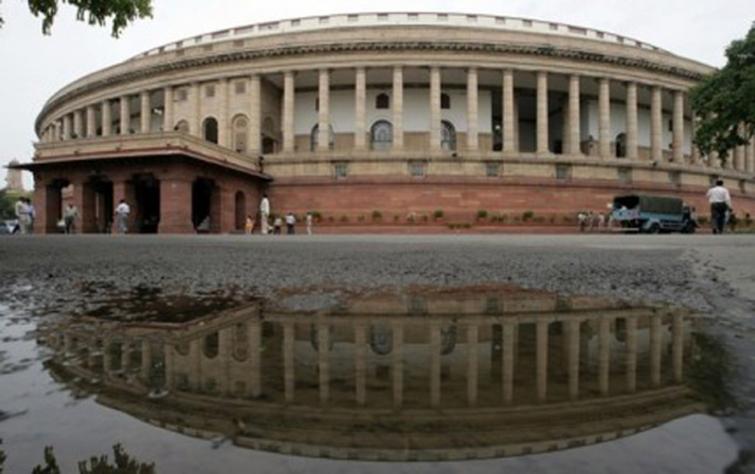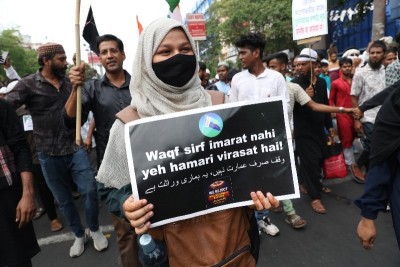 Rajya Sabha
Rajya Sabha
Rajya Sabha sees intense debate on Private Member's bill for CSR contribution towards maintenance of monuments
New Delhi/UNI: A Private Member’s Bill introduced by Vinay Sahasrabuddhe, BJP member and President Indian Council for Cultural Relations (ICCR), to provide for 25 percent of the CSR fund of companies to be spent on the maintenance of monuments and archeological sites, saw intense discussions in the Rajya Sabha, with some members backing the move, while some opposed it.
Sahasrabuddhe’s bill, The Companies Act (Amendment) Bill, 2019, seeks to provide that 25 percent of the two percent that companies keep aside for Corporate Social Responsibility be reserved for the maintenance and upkeep of monuments of national importance.
Congress leader and former minister Jairam Ramesh, opposing the bill, said he was not against the idea of more funding for preservation of the country’s cultural heritage, but that the idea of CSR was different, and was introduced to benefit local communities in backward areas.
Wearing a black armband, to register his protest against the suspension of 12 members by the Chair, Ramesh said that Sahasrabuddhe’s bill would dilute the idea of CSR.
He said that “with a great deal of sadness” he was pointing out that the National Monuments Authority, which was established by an Act of Parliament in 2010 and had experts in the past as the chairpersons, was now occupied by a politician, which he termed "a breach of law".
He also said there was a “rewriting of history” by the government. “We must depoliticize CSR and depoliticize the protection of monuments,” he said, and urged that the bill not be pressed.
Sasmit Patra, BJD member from Odisha, said he backed the bill and the proposal of keeping aside 25 pc of the CSR contribution for the upkeep of monuments.
He said the money that would come through CSR would help preserve the archaeological sites.
Patra spoke about the Ancient Monuments and Archaeological Sites and Remains Act (or AMASR Act) 1958, saying that it needs to be discussed whether it is relevant and contextual. He said that many laws and bylaws and regulations have been added to the act.
He said that an enabling provision of law should be passed to strengthen the Amasr Act, the National Monuments Authority and the Archaeological Survey of India.
Vijaisai Reddy of the YSR Congress Party supported the bill, saying that monuments are the property of the country and of its citizens.
However, he proposed that changes be made to enable companies to give to the CM Cares Fund, and not just to the PM Cares Fund. He also said that the CSR contribution should be admissible under the Income Tax Act, and pointed out that it was P Chidambaram who had amended the Companies Act making it inadmissible.
He said that any profit or loss of the company should be admitted after allowing for the CSR contribution.
He also requested that the Finance Minister should include employees welfare and housing as part of CSR. “When you have included drinking water, health, skill development, women empowerment, environment, rural development, everything, why not employees welfare,” Reddy said.
Fauzia Khan, NCP member from Maharashtra, backed Jairam Ramesh, and said when speaking about heritage one must include diversity, including tribal museums, libraries and historical structures related to diversity.
Manoj Kumar Jha, RJD member from Bihar, said that he had told Sahasrabuddhe that he should bring a proper bill and not a private member’s bill.
He said the government is “walking backwards in history” (ulta paon). Taking a dig at the Central Vista project, he said that “many monuments are being made nowadays”, and added that “Cemented structures have an inherent inclination to become the cemetery of knowledge”.
Mahesh Poddar, BJP member from Jharkhand, replying to the “walking backwards in history” jibe of Jha, said that the Modi government is not walking backwards but “looking back in order to reach that part of history from where we were brought to a wrong track”.
He cited some examples of a Brahmo temple on top of a hill in Ranchi that Rabindranath Tagore used to visit, but the state government and the local authorities are not doing anything to preserve it, as well as a Shiva temple in the midst of the jungle in Ranchi. He said the corporates can help to preserve these sites.
Amee Yajnik of the Congress, opposing the bill, said that when there is a separate authority for the upkeep of national monuments, why should there be an amendment in the Companies Act for CSR for this.
She said the bill should be withdrawn and a detailed presentation on the repair and preservation of heritage for posterity with separate budget allocation should be introduced.
Rakesh Sinha of the BJP, backing the bill, said that while 3,600 monuments are being preserved in the country, there are 7 lakh monuments which are beyond the jurisdiction of the ASI.
Sinha said that India was under a “Europe-centered domination from 1947 to 2014”. “We saved monuments but did not understand their significance,” he said, adding that in 1959 the question was posed in Parliament on why the statues and pictures of Queen Victoria and King Edward were still present in Parliament.
“Monuments are not just a structure, they have a history, a story, and it is important to keep that memory alive, to show that our country is based on that historical foundation,” Sinha said.
Support Our Journalism
We cannot do without you.. your contribution supports unbiased journalism
IBNS is not driven by any ism- not wokeism, not racism, not skewed secularism, not hyper right-wing or left liberal ideals, nor by any hardline religious beliefs or hyper nationalism. We want to serve you good old objective news, as they are. We do not judge or preach. We let people decide for themselves. We only try to present factual and well-sourced news.







